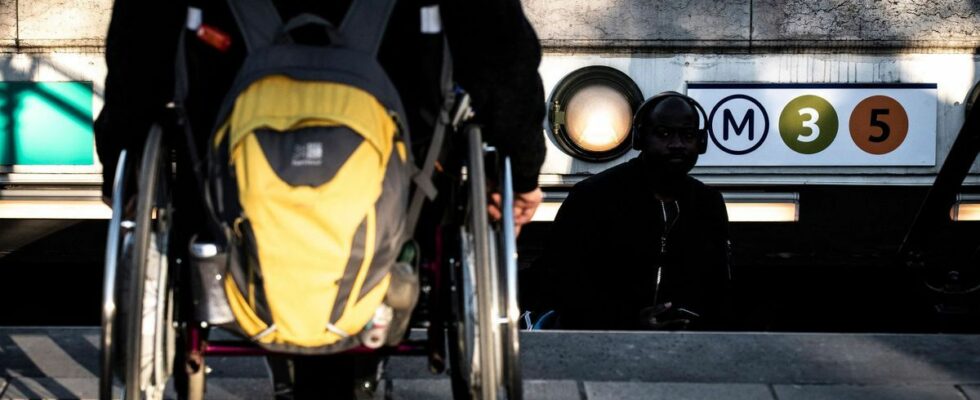Published on
updated on
Reading 3 min.
The long and complex project of accessibility for disabled people in Paris is being brought to the forefront with the Paralympic Games, with the issue of the metro at the forefront.
The maze of corridors and staircases in stations that often lack elevators, as well as platforms that are not adjusted to the height of the trains, make the metropolitan network a mobility black spot for people with disabilities.
At the beginning of August, the president of the Region and of the transport authority Île de France Mobilités (IDFM), Valérie Pécresse, made it the “next ten-year challenge”.
The deputy in charge of accessibility at Paris City Hall, Lamia El Aaraje, also assured that the City would advocate for the project after the Games and that it was “ready to discuss” with partners.
“We will not be able to make the network 100% accessible“due to historical constraints, warns Pierre Deniziot, regional councilor and administrator of IDFM, but “where we can, we must do it.”
Nearly a million people from the Paris region, including 8% of the 2.1 million Parisians, have disabilities.
As the Paralympic Games (August 28 – September 8) approach, only 29 metro stations on two lines (11 and 14) are accessible. The tram and bus lines, however, are “100%” accessible, according to the town hall and IDFM. On the Paris region network (RER, Intercités, TER), four out of five stations, handling 95% of traffic, have been developed for the Games, assures IDFM.
However, Nicolas Mérille, national accessibility advisor at APF France handicap, denounces “segregation that does not say its name: people with disabilities do not have the same daily life at all“.
“No spontaneity”
“We have no right to any spontaneity“, with “always everywhere breaks in our movements“, obstacles in the street or in accessing establishments open to the public, but also in transport, he argues.
RER lines require reservations or to go to a ticket office to be accompanied by agents.
In the evening “it’s much more complicated”, underlines Karim Mimouni, treasurer of the Île-de-France Regional Handisport Committee: “going for a drink” or even “working late” requires having your own vehicle or calling a converted taxi, the number of which increased from 200 to 1,000 with the Games.
The public transport service PAM on demand can be booked 48 hours in advance but is understaffed, IDFM acknowledges.
By the end of September, all establishments receiving the public (ERP) must be compliant.
But at the national level, only 900,000 out of 2 million ERP have started the process, according to the office of the resigning Minister Delegate for Disabled People, Fadila Khattabi. In Paris, there are nearly 40,000, according to the police headquarters.
The city has made 91% of its establishments accessible, inaugurating 17 “increased accessibility districts” (QAA) at the beginning of July, with specific routes to sports, health, cultural or educational facilities.
While he welcomes this work, Nicolas Mérille deplores that “You only have to go out into your neighborhood to see that many places are not accessible.“.
Don’t “miss the boat”
In this context, what are the next steps for the Olympic and Paralympic Games?
On the sports side, “The big challenge we will have in the legacy of these Games is the schedules“, already insufficient for all courses, estimates Vincent Lassalle, president of the Paris departmental disabled sports committee.
Several stakeholders hope that the Games will bring an influx of new members, both able-bodied and disabled.
By the start of the school year, Paris will have 50 “para-welcoming” clubs, with a dedicated section, and 3,400 para-sport licensees, says the deputy mayor in charge of sports and games, Pierre Rabadan.
But the two federations of disabled sport (physical or sensory disability) and adapted sport (mental or psychological disability) are faced with the challenge of support.
“In the water, it is one (accompanying) for one “athlete who must be mobilized”describes Mr. Lassalle, who gives swimming lessons in the 15th arrondissement.
He hopes that the Paralympic Games “will make people want to get involved“. And warns public authorities and associations: “For this to work, we must not miss the boat“.
